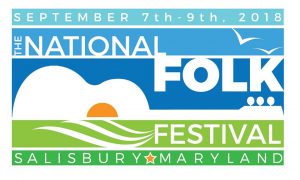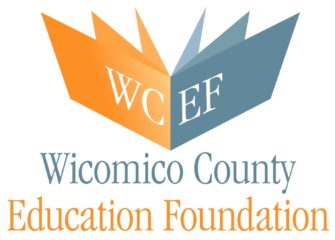
Today, the 78th National Folk Festival, which will take place in downtown Salisbury, September 7 – 9, 2018, announced the Maryland Traditions Folklife Area & Stage program, sharing details about the performers, craftspeople and demonstrators who will be featured in this special area of the Festival in 2018, the first year of the event’s three-year residency in Salisbury.
Adding to the festive air of the press conference was the participation of three masters of Maryland folklife: Rich Smoker, Janice Marshall and the Sensational Royal Lights, who will be among those featured in the Festival’s 2018 folklife program.
The Maryland Traditions Folklife Area & Stage is devoted to celebrating the rich, living traditions of Maryland—from its Atlantic beaches to the Appalachian Mountains. With a different theme each year, the Folklife Area will shine the spotlight on the distinctive music, rituals, crafts, occupations, foodways, and other traditions at the heart of Maryland heritage. Performances, demonstrations, displays, exhibits, and narrative presentations by Maryland masters will express both the state’s deep history and its evolving character.
Chesapeake Traditions is the theme of the 2018 Maryland Traditions Folklife Area program. Curated by Maryland Traditions, the folklife program of the Maryland State Arts Council, and the Ward Museum of Wildfowl Art, Salisbury University, Chesapeake Traditions will explore the region’s rich material, occupational, sacred and musical traditions, which have flourished in the state’s maritime, marsh and agricultural communities for generations. It will feature approximately 20 artists from throughout the Chesapeake region during the free festival. Additionally, the Maryland Traditions Folklife Area & Stage will feature 16 performers and craftspeople from the Maryland State Arts Council’s Maryland Traditions Apprenticeship Awards program. The Maryland Traditions Folklife Area will open at noon on both Saturday, Sept.8, and Sunday, Sept. 9, and continue until early evening each day along Salisbury’s downtown Riverwalk.
“The National Folk Festival is the best possible showcase for artists who are inspired by, and respond to, creative energies that operate on a cellular level. There is an urgency in the necessity to share creative traditions that is as exciting to the audience as it is to the artist,” said Maryland State Arts Council Executive Director Ken Skrzesz.
“Chesapeake Traditions is an ideal theme for our inaugural year of the National Folk Festival in Salisbury, as the Chesapeake Bay has shaped so many communities and the economy of the state for generations, and been a base of creativity for the people of Maryland,” said National Council for the Traditional Arts Executive Director Julia Olin.
On hand for today’s announcement at the Ward Museum of Wildfowl Art, Salisbury University, in Salisbury, were Maryland Traditions Folklife Area program curators Chad Buterbaugh, Director of Maryland Traditions program, and Maryland Traditions partners Lora Bottinelli and Jackson Medel of the Ward Museum. Also participating were Julia Glanz, City Administrator, City of Salisbury; Caroline O’Hare, Local Manager, National Folk Festival; and Julia Olin, Executive Director, National Council for the Traditional Arts.
The Maryland Traditions Folklife Area is produced in partnership with Maryland Traditions, the folklife program of the Maryland State Arts Council, and the Ward Museum of Wildfowl Art, Salisbury University. Avery Hall Insurance has generously sponsored the Maryland Traditions Folklife Stage, allowing for some of the state’s finest performers to share their traditional art forms with the festival audience. Additional support for the Maryland Traditions Folklife Area has been provided by The O’Hare Team at Berkshire Hathaway HomeServices PenFed Realty and Selective Insurance.
The Chesapeake Traditions program will feature:
Rhonda Aaron of Church Creek, sharing her extensive expertise of eel pot construction and traditional trapping techniques.
Jay Armsworthy & Eastern Tradition of California (MD), performing hard-driving bluegrass and beautiful harmonies from southern Maryland.
Hugh & Zane Campbell of Elkton, bluegrass and old-time musicians with a rich family ancestry of traditional Appalachian mountain music.
Chesapeake Bay Maritime Museum of St. Michaels, led by shipyard manager Michael Gorman, who will construct a Smith Island-style skiff from start to finish on the festival grounds.
Joyce Fitchett of Crisfield, eight-time crab-picking champion at the National Hard Crab Derby in Crisfield, demonstrating occupational crab-picking practices.
James Lane of Crisfield, a community scholar, advocate, and native of Crisfield, sharing his knowledge of local heritage and cultural traditions.
Phil Langley of Dameron, with Fish the Bay Charters, presenting his unique experience as a charter fishing boat captain who is also involved in the Chesapeake’s heritage tourism industry.
Janice Marshall of Crisfield, who is deeply rooted in Smith Island traditions, demonstrating crab-picking practices and telling stories about the Smith Island way of life.
Mary Ada Marshall of Tylerton, a Smith Island tradition bearer who is known for her expertise about the process of making Smith Island cake.
Jay Martin of Eden, creator of Provident Organic Farms, sharing his expertise in sustainable food systems in the region.
Pocomoke Indian Nation of Eden, an indigenous tribal organization of the Eastern Shore, demonstrating and interpreting varied Pocomoke traditions and lifeways.
Newell Quinton of Mardela Springs, a scrapple maker and San Domingo community scholar, demonstrating the tradition of scrapple making and its history.
Singing & Praying Bands of Maryland and Delaware (Anne Arundel and Dorchester counties, Maryland, and Sussex County, Delaware), presenting one of the oldest, most historic African American traditions of religious worship still active today.
The Sensational Royal Lights of Catonsville, a family gospel group founded over six decades ago near Cambridge that continues to perform quartet-style gospel music throughout Delmarva.
Kermit Travers of East New Market, a retired skipjack captain of Dorchester County, sharing his vast knowledge of skipjacks and maritime heritage in the Chesapeake Bay.
Michael Whidbee of Crisfield, who will demonstrate the oyster-shucking skills and techniques he has developed over a lifetime in the industry.
Stoney Whitelock of Deal Island, a fourth-generation skipjack captain, who will share the history of skipjacks as working vessels and their centrality to the Chesapeake Bay.
Phil Wiggins Blues House Party of Takoma Park, fronted by an award-winning harmonica wizard, with an exuberant celebration of Piedmont blues music and dance inspired by rural house parties.
In addition to the Chesapeake Traditions demonstrations and performances, Sunday September 9th will feature performances by Maryland Traditions Apprenticeship Awards’ master/apprentice teams:
Shodekeh & Ian Hesford of Baltimore, Tuvan throat singing
Mama Linda Goss & Dr. David Fakunle of Baltimore and Laurel, African American storytelling
Andrea Hoag & Christopher Ousley of Brentwood, Swedish fiddling
Mohammadreza Kazemifar & Ali Analouei of Potomac and Rockville, Persian classical singing
Chum Ngek & Suteera Nagavajara of Gaithersburg and Takoma Park, homrong (Cambodian classical music)
Anna Pasqualucci & Lisa Marie Penn of Lithicum (MD) and Glen Rock (PA), screen painting
Rick Smoker & Kenny Glasgow of Marion Station and Princess Anne, decoy carving
Sebastian Wang & Sanghyuk Park of Kensington and Laurel, samulnori (traditional Korean percussion)
The 78th National Folk Festival will feature approximately 350 musicians, dancers, puppeteers, storytellers, and craftspeople, continuous performances on seven stages, the Maryland Traditions Folklife Area & Stage, a dance pavilion, a Family Area, a Festival Marketplace, and regional and ethnic foods. The three-day Festival is FREE to the public.
For more information on the Maryland Traditions Folklife Area program, visit: NationalFolkFestival.com/folklife
For more information on the 78th National Folk Festival visit NationalFolkFestival.com
###
About the National Council for the Traditional Arts (NCTA)
The creator of the National Folk Festival, the National Council for the Traditional Arts (NCTA), is a leading non-profit in the field, dedicated to the presentation and documentation of folk and traditional arts in the U.S. Stressing excellence and authenticity, the NCTA brings the nation’s finest traditional artists to the public in major festivals, tours, concerts, workshops, demonstrations, exhibitions, media productions, school programs, cross-cultural exchanges and other activities. It works in partnership with American communities to establish new, sustainable traditional arts events that deliver lasting social, cultural and economic benefits. Over 7,000 hours of the NCTA’s archival audio recordings dating from the 1930s are permanently housed at the American Folklife Center at the Library of Congress. The NCTA champions the interests of folk and traditional artists and organizations in the arena of public policy. http://www.ncta-usa.org/
About the National Folk Festival
First presented in St. Louis in 1934, the National Folk Festival is the oldest and longest-running multicultural traditional arts celebration in the nation. It has celebrated the roots, richness and variety of American culture for 84 years. Championed in its early years by Eleanor Roosevelt, it was the first event of national stature to present the arts of many nations, races, and languages on equal footing. It was also the first to present to the public musical forms such as the blues, Cajun music, polka, Tex-Mex conjunto, Peking Opera, and many others. Today, the National is an exuberant traveling festival; produced by the NCTA in partnership with communities around the country, it embraces the diverse cultural expressions that define us as a people in the 21st century. http://www.nationalfolkfestival.com/
About the 78th National Folk Festival in Salisbury, 2018: Produced by the National Council for the Traditional Arts (NCTA) and the City of Salisbury, with a host of local, state and national partners and supporters, the National Folk Festival begins its three-year residency in downtown Salisbury this year, its 78th year, from September 7 – 9, 2018. The FREE, three-day event is America’s longest-running festival of traditional arts; celebrating the best of nation and best of Maryland, it will set the stage for a continuing festival in 2021, after the “National” moves on.
About the Ward Museum of Wildfowl Art, Salisbury University
The Ward Museum of Wildfowl Art, Salisbury University is nestled next to Schumaker Pond in Salisbury, Maryland. Surrounded by wildlife in the heart of the Atlantic Flyway, the Museum features the world’s largest and finest public collection of decorative and antique decoys. The Museum was named in honor of Lem and Steve Ward, whose vision and artistry in carving decoys pioneered the transition of the decoy from a working tool to an expressive wildfowl sculpture. The Ward Museum is a cherished part of its local community on the Eastern Shore of Maryland and far beyond. Maintaining an international reputation for excellence through artworks that allow visitors a glimpse of the beauty of wildfowl from around the world has made the Ward Museum a prominent Maryland institution. With members in all 50 states and 8 countries, the reach of this institution reflects the wide appeal and interest in an art form that reveals the interconnections of art, nature, and tradition. As wildfowl has been celebrated in art across continents and throughout human history, the Ward Museum galleries showcases the contributions of artists who have carved birds both as tools for the hunt and as objects of artistic enjoyment. http://www.wardmuseum.org/
About Maryland State Arts Council and Maryland Traditions
Founded in 1967, the Maryland State Arts Council (MSAC) is an agency of the State of Maryland Department of Commerce, Division of Tourism, Film and the Arts, and encourages and invests in the advancement of the arts for all Marylanders. Its grants and programs support artists and arts organizations in their pursuit of artistic excellence, ensure the accessibility of the arts to all citizens, and promote statewide awareness of arts resources and opportunities. MSAC awards grants to not-for-profit, tax-exempt organizations and individual artists, and provides technical and advisory assistance to individuals and groups. The agency is funded by an annual appropriation from the State of Maryland and a grant from the National Endowment for the Arts. MSAC may also receive contributions from private, non-governmental sources. Maryland Traditions is the folklife program of the Maryland State Arts Council. Since 1974, state-employed folklorists have worked to identify, document, support, and present Maryland folklife through grants, awards, festivals, and other programming. For more information about Maryland Traditions, go to http://www.msac.org/programs/maryland-traditions
About the City of Salisbury, Maryland
Founded in 1732, Salisbury is the county seat of Wicomico County, a place where John Smith touched land in 1608 during his exploration of the Chesapeake Bay. Situated on Maryland’s historic Eastern Shore at the crossroads of the Delmarva Peninsula, Salisbury is now one of the region’s largest cities, and serves as the capital of the Eastern Shore, a rural area defined by its agricultural and maritime traditions, landscapes and industries. The Chesapeake Bay is central to this distinctive identity. Though a relatively small city, Salisbury is the geographic and economic hub of one of the nation’s fastest-growing Metropolitan Statistical Areas. Led by a dynamic mayor, the City of Salisbury is working to build its reputation as an arts and culture destination, and is aligning its downtown development and revitalization efforts with the arts. Salisbury believes hosting the National Folk Festival is the perfect catalyst to further a cultural renaissance and urban renewal. http://www.salisbury.md/http://www.salisbury.md/



